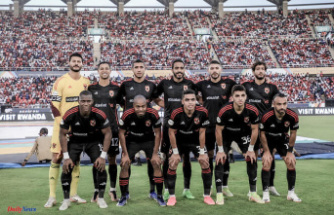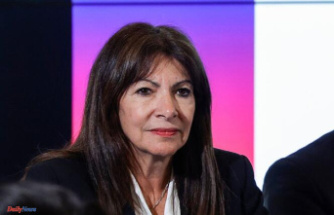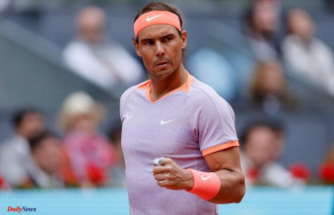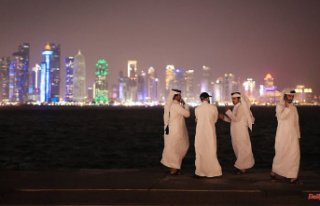The opening day of the World Cup in Qatar. The opening game takes place far from the gates of Doha. While there is something like a World Cup mood in the glittering capital of the capital, there is monumental traffic chaos around the Al Bayt Stadium. There is a danger of collapse behind the facades of the tournament.
The day of the opening game. A football World Cup is finally in the air. The subways aren't crowded and there's no singing, but fans from different nations bustle about on the trains. Americans meet and greet each other with a triple "USA, USA, USA". There's the woman in her mid-forties in a Mexican jersey carrying shopping bags. Or the group of Ecuador fans preparing for the game against Qatar in the evening. The station shop offers traditional Qatari robes in the national colors for last-minute travelers without any paraphernalia, or for fans who like it a bit more extravagant. Alone: The shop is completely empty.
In the Doha Festival City Mall, the largest mall in the city, there is also a World Cup atmosphere. The mall is on one of the major roads heading north. Technically, it no longer belongs to Doha, but to Umm Salal Muhammed, a settlement of almost 100,000 inhabitants. No fans of other nations stray here. From the compounds, these housing developments stamped in the sand and rubble, the cries of children can be heard. They are chasing a ball.
Of course, the mall is also about football. The mood isn't what you might know from Germany, but there's something in the air. An older man in a traditional robe is already standing at the entrance, playing passes to visitors with a small, green soccer ball. He is pleased. A few fans gather in the food court. Some, including women, have painted the Qatari flag on their faces.
On the way to the Al-Bayt Stadium, you leave the metropolis of Doha and head into the barren no-man's-land of the desert. Egyptian colleagues in the media bus put the German team among the absolute top favorites at this tournament as well. The air conditioning booms menacingly at refrigerator level, journalists wrap themselves up.
Then the newly built, state-of-the-art arena appears on the horizon. In the middle of nowhere The obligatory stadium traffic jam is not missing in Qatar either. Trucks and pick-ups with commercial vehicles that are actually banned from some access roads for the duration of the tournament are also in the middle of the traffic jam, which they shouldn't be in. On the right side, important-looking columns keep pushing past the long rows of cars, among which there are also trucks with Egyptian flags. Blue lights, motorcycles, big SUVs with tinted windows.
Sometimes a red police car rushes by. Among Qatar's myriad police types, they are among the very top in the system. They also have other cars in tow. Some drivers take their luck into their own hands, stand across the road and of course don't get any further. Everything stands still.
The time for the opening ceremony is ticking down. The tent in the desert is visible from afar, but unreachable, is sometimes enveloped by a sandstorm, a helicopter roars its rotor blades and watches the scenery from above. Car doors open and spit out people who set off on foot through the scree desert. In the distance some policemen are waving and trilling and organizing the traffic. If you approach them from the desert, they smile and point the way to the stadium. More and more embark on the long march through the desert.
The last few meters are flanked by bright headlights. VVIPs, VIPs and media in one direction, the other viewers in the other direction. Hired assistants are everywhere, the well-known police officers in tracksuits are everywhere, and they will send you in one direction and then the other. With volume, hectic and stern faces, they block paths and invent detours.
The amount of unskilled workers, temporary police officers, real police officers, volunteers makes the chaos immeasurable. It is guarded in an obvious arbitrary manner, ordered, tumbled about, excited with whistles. Many of the helpers deployed probably not only appear as if they are in this particular place for the first time. Overwhelmed, without a plan, without even an idea of where they are at the moment.
Admission seems to be well regulated this time, in contrast to Fanfest, where there were tumultuous scenes and panic the day before. Too bad: There is hardly any contact between fans in front of the stadium, the entrance areas are all far away from each other. The way back is much more difficult. While the column of Saudi crown princes rushed by and shortly afterwards the emir took off in a helicopter, media representatives stood in long queues and waited more than an hour for the bus. But lo and behold: shortly before midnight there are still songs and drums in the metro. It's fans in Ghana shirts looking forward to Thursday's opening game against Portugal.
Every step into the many facades of this World Cup is like stepping into a hollowed-out film set that could collapse at any moment. Every step into the many facades of this World Cup is a step into the great chaos. Every step in the many facades of this football World Cup raises new questions and the bitter stench of megalomania, death and the subjugation of the people hovers over everything.












